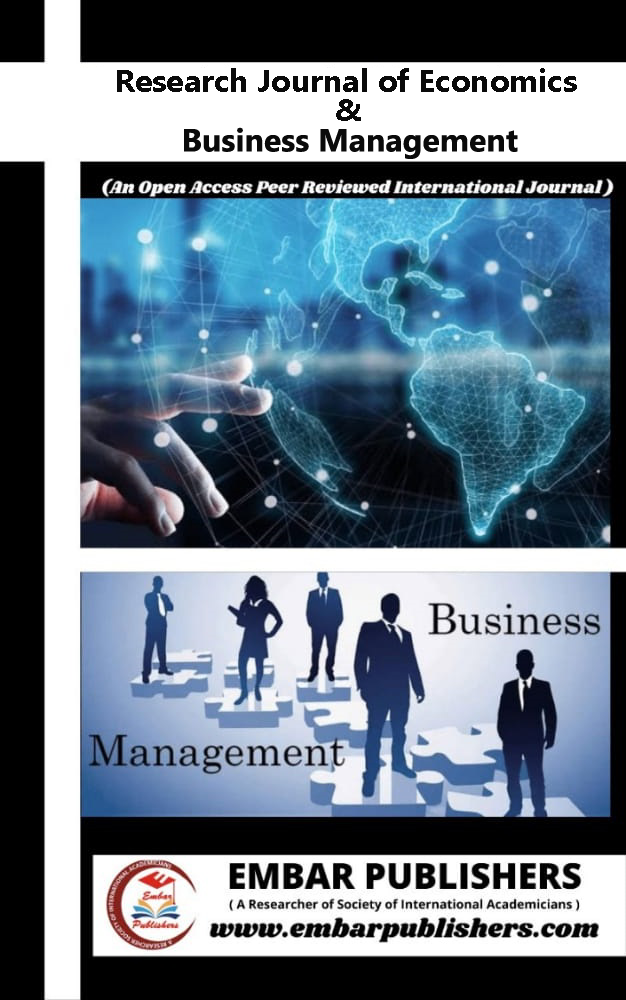
Harnessing Artificial Intelligence in Sustainable Tourism in the Post-Pandemic World
Zijun Zhao
Dongying Jinqiao International Travel Agency Co., Ltd, No. 60-2 Shengxing Road, Dongying District, Dongying City, China.
DOI: doi.org/10.58924/rjebm.v4.iss1.p1
Published Date: 08-Feb, 2025
Keywords: Artificial Intelligence, Sustainable Tourism, Environmental Monitoring, Resource Optimization, Post-Pandemic Tourism, Carbon Footprint Reduction
Abstract:
The tourism industry around the world is constantly being challenged to adopt sustainability due to environmental imperatives and changed traveler preferences. This paper examines the transformative role that artificial intelligence can take in the post-pandemic era in the development of sustainable tourism. From applications in environmental monitoring, resource optimization, carbon footprint reduction, waste management, and developing personalized sustainable experiences, AI can be seen as a crucial enabler of tourism in tune with ecological goals. Besides, the paper mentions challenges such as costs, technical barriers, and ethical ones, keeping in mind balanced implementation approaches. In any case, AI, from the perspective of sustainable tourism, opens opportunities for the protection of ecosystems and experiences for visitors.
References:
1. Afzal, M. I., Al. Azhari, S., Kishwer, R., & Shah, S. B. A. (2024). Sustainable Expansion of the Tourist Industry Due to the Application of Artificial Intelligence: Evidence from the Chinese Hospitality Industry. In The Role of Artificial Intelligence in Regenerative Tourism and Green Destinations (pp. 85-99). Emerald Publishing Limited. https://www.emerald.com/insight/content/doi/10.1108/978-1-83753-746-420241006/full/html
2. Al-Romeedy, B. S., Emam, M. E., & Tyagi, P. K. (2025). Exploring Waste Reduction Potential in Rural Tourism: What Solutions Can Be Implemented?. In Solid Waste Management for Rural Regions (pp. 193-214). IGI Global Scientific Publishing. https://www.igi-global.com/chapter/exploring-waste-reduction-potential-in-rural-tourism/363984
3. Banerjee, A., Mahmudov, T., Adler, E., Aisyah, F. N., & Wörndl, W. (2024). Modeling Sustainable City Trips: Integrating CO2 Emissions, Popularity, and Seasonality into Tourism Recommender Systems. arXiv preprint arXiv:2403.18604.https://arxiv.org/abs/2403.18604
4. Basu, A., & Basu, L. B. (2021). Questioning the green recovery: a take on Post-COVID scenario. In COVID-19 Pandemic Trajectory in the Developing World: Exploring the Changing Environmental and Economic Milieus in India (pp. 117-144). Singapore: Springer Singapore.https://link.springer.com/chapter/10.1007/978-981-33-6440-0_6
5. Belsoy, J., Korir, J., & Yego, J. (2012). Environmental impacts of tourism in protected areas. Journal of Environment and Earth Science, 2(10), 64-73.
6. Dauvergne, P. (2020). AI in the Wild: Sustainability in the Age of Artificial Intelligence. MIT Press.
7. Haider, S., Rashid, M., Tariq, M. A. U. R., & Nadeem, A. (2024). The role of artificial intelligence (AI) and Chatgpt in water resources, including its potential benefits and associated challenges. Discover Water, 4(1), 113.https://link.springer.com/article/10.1007/s43832-024-00173-y
8. Heikinheimo, V., Di Minin, E., Tenkanen, H., Hausmann, A., Erkkonen, J., & Toivonen, T. (2017). User-generated geographic information for visitor monitoring in a national park: A comparison of social media data and visitor survey. ISPRS International Journal of Geo-Information, 6(3), 85.https://doi.org/10.3390/ijgi6030085
9. Jain, P., Jain, P., & Jain, A. (2024). Harnessing Artificial Intelligence for Sustainable Tourism Practices. In The Need for Sustainable Tourism in an Era of Global Climate Change: Pathway to a Greener Future (pp. 249-267). Emerald Publishing Limited. https://www.emerald.com/insight/content/doi/10.1108/978-1-83608-668-020241034/full/html
10. Kalra, S., & Taneja, C. (2022). Sustainable tourism behaviour in the post pandemic era. Academy of Marketing Studies Journal, 26(2).
11. Kannan, R. (2024). Revolutionizing the Tourism Industry through Artificial Intelligence: A Comprehensive Review of AI Integration, Impact on Customer Experience, Operational Efficiency, and Future Trends. International Journal for Multidimensional Research Perspectives, 2(2), 01-14. https://www.chandigarhphilosophers.com/index.php/ijmrp/article/view/115
12. Khan, N., Khan, W., Humayun, M., & Naz, A. (2024). Unlocking the Potential: Artificial Intelligence Applications in Sustainable Tourism. The Role of Artificial Intelligence in Regenerative Tourism and Green Destinations, 303-316. https://www.emerald.com/insight/content/doi/10.1108/978-1-83753-746-420241020/full/html
13. Mobo, F. D., Garcia, A. L. R., & Miłek, K. (2025). Leveraging AI for Real-Time Environmental Monitoring: Innovations and Impacts. In Harnessing AI in Geospatial Technology for Environmental Monitoring and Management (pp. 201-212). IGI Global Scientific Publishing. https://www.igi-global.com/chapter/leveraging-ai-for-real-time-environmental-monitoring/364535
14. Palahan, S., & Arunthari, S. (2024, April). Innovating Tourism: Personalized Recommendations through AI. In Proceedings of the 2024 2nd Asia Conference on Computer Vision, Image Processing and Pattern Recognition (pp. 1-5). https://doi.org/10.1145/3663976.3663991
15. Pasanchay, K., & Schott, C. (2021). Community-based tourism homestays' capacity to advance the Sustainable Development Goals: A holistic sustainable livelihood perspective. Tourism Management Perspectives, 37, 100784.https://doi.org/10.1016/j.tmp.2020.100784
16. Patrichi, I. C. (2024). AI Solutions for Sustainable Tourism Management: A Comprehensive Review. Journal of Information Systems & Operations Management, 18(1), 172-185. https://www.proquest.com/openview/c4186efe32430cdea07de5c03ba27d52/1?pq-origsite=gscholar&cbl=1216366
17. Popescu, S. M., Mansoor, S., Wani, O. A., Kumar, S. S., Sharma, V., Sharma, A., ... & Chung, Y. S. (2024). Artificial intelligence and IoT driven technologies for environmental pollution monitoring and management. Frontiers in Environmental Science, 12, 1336088. https://www.frontiersin.org/journals/environmental-science/articles/10.3389/fenvs.2024.1336088/full
18. Serrano-Bernardo, F. A., Bruzzi, L., Toscano, E. H., & Rosúa-Campos, J. L. (2012). Pollutants and greenhouse gases emissions produced by tourism life cycle: Possible solutions to reduce emissions and to introduce adaptation measures. Air pollution-A comprehensive perspective, 105. https://www.google.co.in/books/edition/Air_Pollution/292dDwAAQBAJ?hl=en&gbpv=1&dq=tourism+air+travel,+accommodation,+and+local+transportation,+which+significantly+contribute+to+greenhouse+gas+emissions&pg=PA105&printsec=frontcover
19. Singh, A. B., Gaurav, G., Sarkar, P., Sharan Dangayach, G., & Lal Meena, M. (2024). Current understanding, motivations, and barriers towards implementing sustainable initiatives in the hospitality industry in the age of automation and artificial intelligence. Recent Patents on Engineering, 18(7), 2-25. https://doi.org/10.2174/0118722121239293230926034213
20. Veeranjaneyulu, R., Govindarajan, D., Subramanian, C., Devi, D. U., Banerjee, S., Edpuganti, S. K., & Upadhyay, S. (2024). Marine Ecosystem Monitoring: Applying Remote Sensing and AI to Track and Predict Coral Reef Health. Remote Sensing in Earth Systems Sciences, 1-14.https://link.springer.com/article/10.1007/s41976-024-00141-z
21. Vetrivel, S. C., Vidhyapriya, P., & Arun, V. P. (2025). AI-Driven Solutions for Crowd Management in Tourism: Navigating the Swarm. In AI Technologies for Personalized and Sustainable Tourism (pp. 83-112). IGI Global. https://www.igi-global.com/chapter/ai-driven-solutions-for-crowd-management-in-tourism/359252

ISSN(Online): 2945-3941
Publisher: Embar Publishers
Frequency: Bi-Monthly
Chief Editor: Dr. Himanshu D. Tiwari
Language: English
